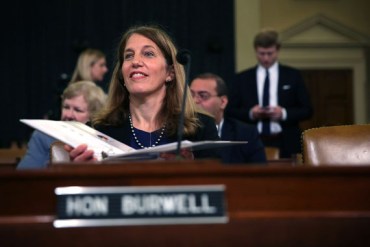
U.S. Secretary of Health and Human Services Sylvia Burwell waits for the beginning of a hearing before the House Ways and Means Committee June 10, 2015 on Capitol Hill in Washington. (Photo by Alex Wong/Getty Images)
Could she believe what she heard?
Sitting in her office Thursday morning, Health and Human Services Secretary Sylvia Burwell saw on her computer screen that the Supreme Court was about to announce its ruling on a challenge that could cripple the health law. “You knew this was it,” she said.
As she rushed down the hall to a conference room where her team was waiting, Burwell heard a cheer. “And that’s the moment that I knew” the justices had upheld the law’s subsidies helping more than 6 million people purchase health insurance, she recalled.
“I’m like, ‘Are we sure?’ ” she said. “Of course everyone was reading through quickly and following it at that point.”
But, she added, it was more than just a legal victory. “It was very emotional because I met all those people,” Burwell said, visibly moved as she described her reaction to the ruling. “When you meet all these individuals [who have benefited from the health law], it really does touch you in terms of what it means. … You couldn’t help your kids, or you couldn’t take care of your parents, and that’s what these people face.”
During the past few months, Burwell had insisted there was no “Plan B” if the court were to strike the subsidies. With the court’s ruling in place, an insurance “death spiral” — where only sick people stay in the health law’s online marketplaces, or exchanges and healthier individuals drop out — has been averted. But Burwell acknowledges there are many challenges ahead.
Enrollment needs to continue to grow and those who get coverage need to better understand their benefits, Burwell said Friday in a briefing with reporters. Her agency must continue to work with governors to find middle ground that will help them accept the law’s Medicaid expansion. People with employer-based insurance must understand how the law benefits them – for example, adult children up to age 26 can stay on their parent’s health insurance plan and no out-of-pocket payments are required for preventive care. The law’s tools to improve the way health care is delivered or to help detect waste, fraud and abuse in federal health care programs must be better understood, Burwell said.
While it’s clear that President Barack Obama will reject some proposed changes to the law, such as a repeal of its requirement that most Americans purchase coverage or the House-passed legislation to repeal the law’s medical device tax, Burwell said the administration is open to ideas that improve affordability, access and quality. “We have work to do. This [law] can be better,” she said.
Implementing a law as sweeping and as complicated as the Affordable Care Act will continue to occupy much of Burwell’s time in the less than two years left in her tenure (or, as Burwell reminds you, 1 year, 6 months and 23 days). And, as she says, “there will always be more to do.”